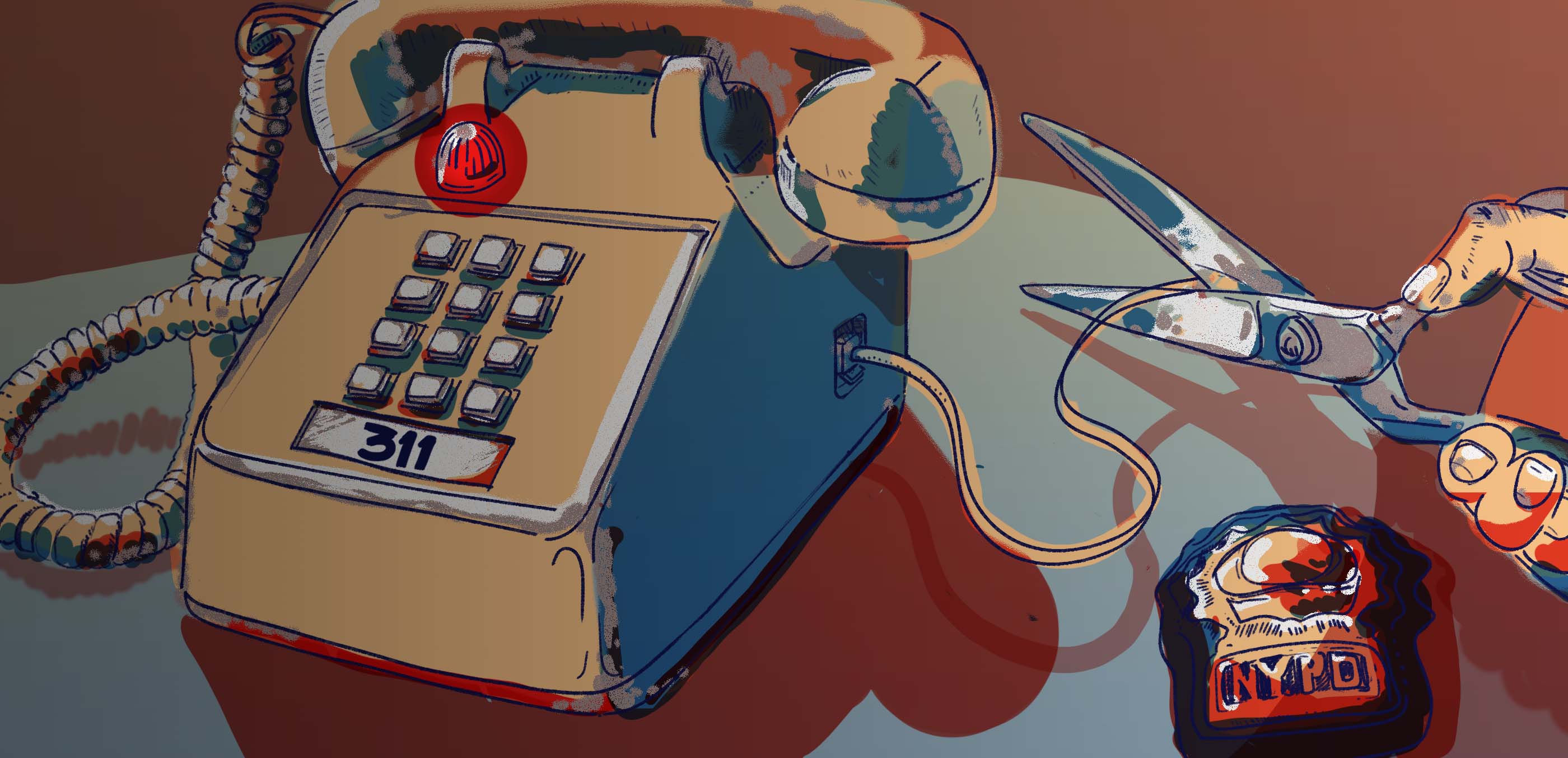On July 9, 2018, a complaint flowed into 311, New York City’s municipal services center: blocked bike lane, Central Park West.
It was the 15th time in two years that someone had notified 311 about drivers parking illegally on the then-unprotected strips of white paint on Manhattan’s Upper West Side. And, like reports that came before it, this one compelled little response from the New York Police Department, the city agency responsible for keeping bike lanes clear.
“This complaint does not fall under the Police Department's jurisdiction,” the police wrote back to the complainant an hour later, and marked the service request as closed.
Thirty-two days later, an Uber driver stopped illegally in that same Central Park West bike lane, two blocks farther north, forcing 23-year-old Australian tourist Madison Lyden to navigate her bike into traffic. There, she was run over by a driver who had three empty cans of beer in his truck.
Lyden’s mother, Amanda Berry, did not know about the 311 reports that preceded her daughter’s death until Streetsblog contacted her last week. Learning of them left her “aghast,” she said.
"If the Uber driver that was blocking the lane had a fear of being fined on that beautiful sunny day my daughter was killed, maybe he wouldn’t have been there, and Madison would be sitting across the kitchen bench from me now,” Berry wrote from her home in Tasmania. "If the police don’t take these complaints seriously, then what? More people get killed or seriously injured?”
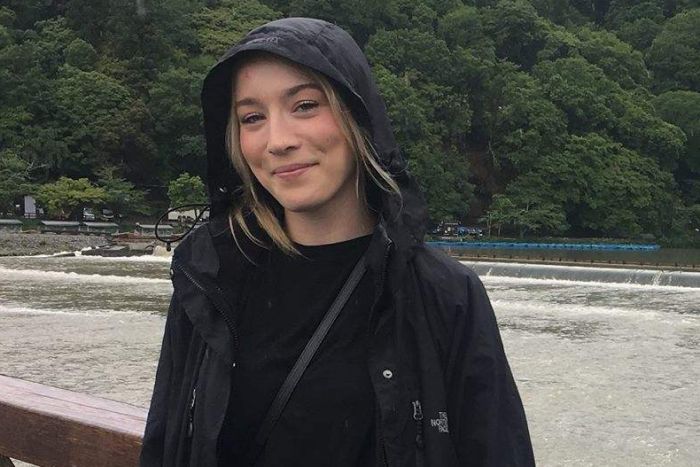
Since Lyden’s death, little appears to have changed in how the NYPD handles 311 complaints about driver misconduct. Even as Mayor de Blasio steadfastly touts the department as a key partner in his effort to eliminate traffic deaths, police routinely ignore notifications about illegal parking, chronically reckless driving and abandoned vehicles, a Streetsblog investigation found. This disregard has fostered a culture of lawlessness on city streets that residents say is getting worse as traffic deaths climb to their highest point in years.
Streetsblog analyzed more than 26 million 311 complaints, known as service requests, dating back to 2010, and interviewed dozens of city officials, former city police officers, safe-streets advocates, attorneys and residents who have filed years of 311 reports. This reporting showed:
- The NYPD now closes thousands of service requests about driver misconduct each year in under five minutes, up from only five such complaints that were closed so quickly in 2010. Former city officials said it was implausible that officers were actually investigating and resolving so many complaints in under five minutes, given it takes the NYPD more than seven minutes on average to respond to even the most critical emergencies, per city data. (Streetsblog is defining driver misconduct as a group of 17 service requests related to illegal parking, chronically reckless driving and abandoned vehicles that 311 routes to the NYPD. See the full list below.)
- Officers rarely write tickets in response to 311 reports on driver misconduct, and they routinely dismiss driver misconduct reports as outside the police department’s jurisdiction. Attorneys and former city officials said that justification is false, as such issues are clearly the police's responsibility.
- Residents who together have filed more than an estimated 1,000 driver misconduct service requests say those efforts have almost never led to the problems being addressed. Some reported receiving harassing messages after filing complaints.
- Some officers appear especially dismissive of such complaints. In one Brooklyn precinct, 16 percent of driver misconduct reports this year have been closed in under five minutes.
The increase in complaints closed within five minutes has coincided with a drop in moving violation tickets issued by the NYPD, Streetsblog has reported. For New Yorkers who have relied on 311 to notify the city about problems in their neighborhoods, the consequences of police inaction are increasingly apparent: sidewalks strewn with cars, dubious-looking parking placards on more and more dashboards and drivers emboldened to test the limit.
“Word is out that the cops aren’t doing anything about it,” said Jon Orcutt, a former city Department of Transportation policy director. “The fact that law enforcement is just remarkably unaccountable and unresponsive to citizens is a disaster for the city.”
'Red flags'
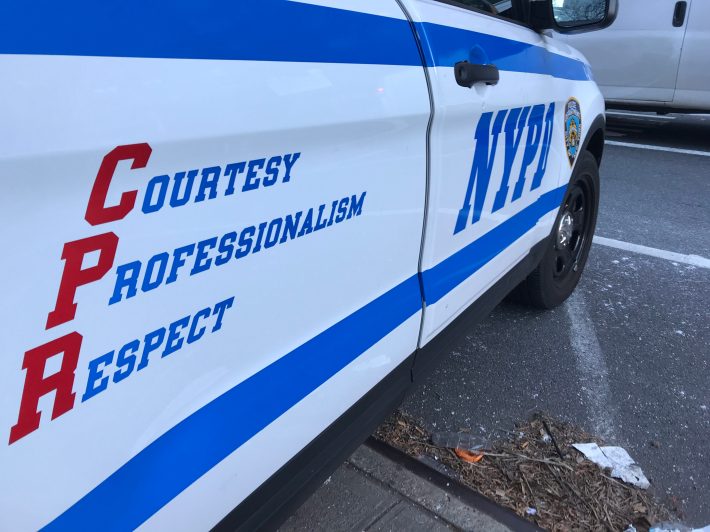
When then-Mayor Mike Bloomberg introduced the city’s 311 system nearly 20 years ago, he vowed it would usher in a new era of open government, one in which municipal agencies would be easier to reach, and more responsive to complaints, than ever before.
“This will make city government accessible to every resident of this great city,” he said in 2002.
Since then, 311 has grown into the largest municipal information and service center in the country. With an annual budget of $56 million, the agency has 327 employees who process more than 20 million calls each year, plus millions of additional complaints submitted online and through the 311 app.
But 311 agents merely route the service requests to city departments — it’s left to those departments to respond to them. And the NYPD’s response to 311 service requests has been a longstanding source of ire for safe streets activists.
Complaints about blocked bike lanes, abandoned vehicles and other cars parked illegally were ignored, critics said. Examples spread widely on social media but remained mostly anecdotal. Then, in 2020, as the Covid-19 pandemic surged, a new issue appeared in the data on the NYPD’s response to complaints.
Suddenly, officers were closing tens of thousands of 311 reports in under five minutes: nearly 100,000 in 2020, or 8 percent of them, up from just 7,000 the year prior. Complaints about driver misconduct were no exception: more than 8,000 of them were closed in under five minutes last year — a more-than-2,000-percent increase from 2016. The department is on track to surpass last year's number this year.
Relative to all driver misconduct complaints the NYPD receives, the number closed in under five minutes is small. But it has grown in every category. From 2016 through Sept. 27 this year, the number of complaints closed in under five minutes went from:
- Less than 1 percent to 4 percent for abandoned vehicles with license plates.
- One percent to 6 percent for blocked bike lanes.
- Less than 1 percent to 10 percent for chronic stoplight violations.
“As soon as you see something like that, I would be suspicious that it isn’t getting answered properly,” said a former high-ranking NYPD official, who requested anonymity to speak candidly. “Red flags should be going up.”
The NYPD did not respond to questions for this story.
Not police jurisdiction
There’s been one bright moment in Kevin Duffy-Greaves' experience with 311, but it was short lived.
Earlier this year, the Brooklyn resident filed multiple 311 complaints about cars parked illegally on the sidewalk outside a mechanic shop in Boerum Hill. But the 78th Precinct closed out his reports, and the illegally parked cars remained.
Once, however, the department responded to one of his complaints by saying it issued a parking summons. The only problem: it appears not to be true.
There’s no record of the summons in a city database of parking tickets, although the database is not yet complete for the date in question. But an employee of the business, who gave his name only as Anthony, told Streetsblog that none of its cars have ever received a ticket.
Duffy-Greaves said he was “disappointed, but not surprised” by the discrepancy.
“They can brazenly file complete lies with no consequences,” he said.
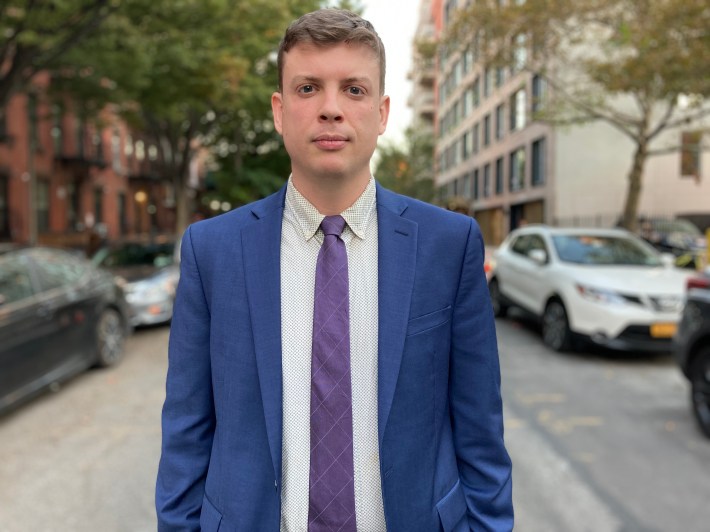
Frantz Souffrant, the commanding officer of the Park Slope-area precinct, did not respond to a request for comment.
The NYPD rarely responds to 311 complaints about driver misconduct by saying it has issued a summons — just 11 percent of the time since 2010.
But the rate has gone up since then, as has the frequency with which the NYPD responded that it “took action to fix the condition."
Still, some 311 users no longer believe the NYPD’s official replies to their service requests, especially given how frequently officers invoke the response that preceded Madison Lyden’s death: “This complaint does not fall under the Police Department's jurisdiction.”
The department has used the justification to close more than 6,000 driver misconduct 311 complaints this year. But the former NYPD official said it is simply false.
“Those are absolutely in police jurisdiction,” he said.
Attorney Steve Vaccaro, who has years of litigation experience against the NYPD, agreed.
“To say that it’s not within the Police Department’s jurisdiction to address those problems is preposterous,” he said. “If not the Police Department, then who?”
Problems in Brooklyn
Duffy-Greaves’s issues with the 78th Precinct are not outliers. Streetsblog’s analysis found 311 complaints about driver misconduct are closed in under five minutes at a higher rate there than anywhere else in the city. Among the findings:
- The precinct closed 16 percent of driver misconduct complaints in under five minutes this year through Sept. 27. The citywide average is 3 percent.
- That includes 18 percent of complaints about posted parking sign violations and 19 percent of complaints about blocked bike lanes.
- The precinct also says such issues are outside its jurisdiction at a far higher rate than others in the city: 21 percent so far this year, compared to two percent for all precincts.
Streetsblog observed firsthand the 78th's inaction in response to 311 complaints. On a recent afternoon, a reporter filed a 311 service request about a Postal Service truck blocking a bike lane on Seventh Avenue in Park Slope. The police closed the complaint 23 minutes after it was filed, writing that the issue was not in the department's jurisdiction. No officers visited the site and the truck didn't move.
Resident Tara Hayward said she was not surprised of the 78th's distinction, given the state of the pedestrian areas outside their own station house.
“They’re just parked all over the sidewalk,” she said.
Calls in the night
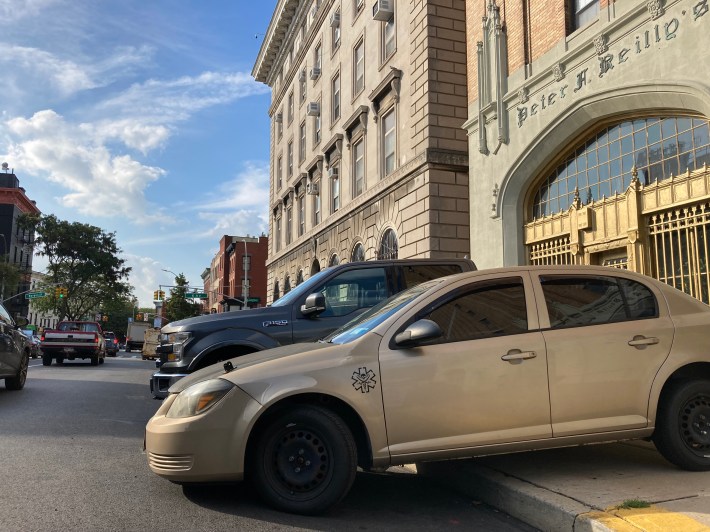
Multiple people interviewed by Streetsblog said they’ve received harassing phone calls after filing 311 complaints about driver misconduct.
That includes Chong Bretillon, of Queens. On around six occasions, she said, she’s received a barrage of calls from concealed phone numbers in the middle of the night after filing 311 complaints about illegal parking hours earlier. Occasionally, the callers would leave messages, one of which contained only the sound of heavy breathing.
She said she believes it was officers seeking to intimidate her into no longer filing complaints.
“Nobody calls someone at 3 a.m. There’s just no reason to do it,” she said. “Unless you’re trying to harass somebody.”
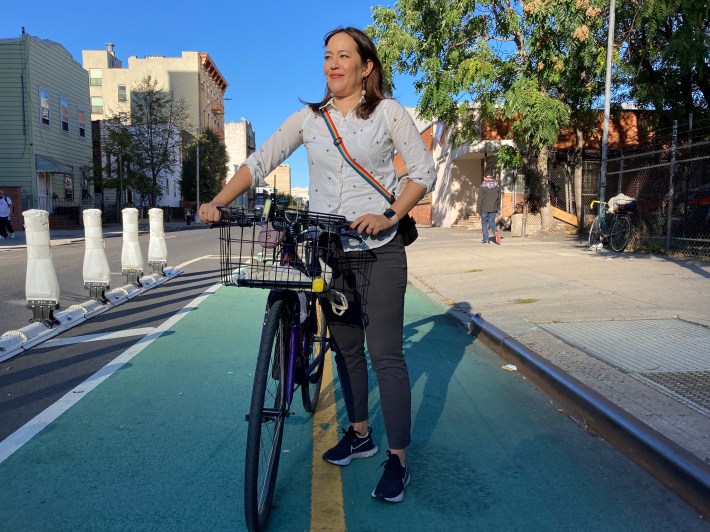
Paul Vogel, of Brooklyn, has also received strange voicemails from blocked phone numbers after filing 311 complaints. In one, a man says Vogel's name repeatedly without identifying himself. In another, the caller breathes heavily into the phone and hangs up.
"It just strikes me as clearly something that’s done to intimidate," he said. "It’s bizarre."
Accountability concealed
The city has measures in place to assess whether agencies are properly responding to 311 complaints. But what those measures are — and whether agencies are meeting them — remains largely hidden from the public.
Every type of 311 service request has a corresponding “service level agreement,” which dictates how quickly the assigned agency should respond, city records show. But 311 spokesman Bill Reda and de Blasio spokeswoman Kate Smart declined Streetsblog’s request for a comprehensive list of them, saying only that “technical work is underway” to post them online.
The annual Mayor’s Management Report indicates the city tracks how well agencies are meeting those service level agreements. But the report lists only a few 311 categories per agency, and Reda and Smart declined to provide complete performance data.
Reda and Smart also did not answer a question about whether the city audits agencies’ purported response times to determine whether they are completing requests when they say they are.
Other city records indicate the city has known for years about deep dissatisfaction with the NYPD’s handling of 311 complaints. Manhattan safe streets activist Jehiah Czebotar obtained, via a Freedom of Information request, a database of close to 60,000 311 customer satisfaction surveys completed in 2018 and 2019, and shared it with Streetsblog. It shows only 31 percent of respondents were satisfied with the NYPD’s handling of their 311 complaints — one of the lowest rates of any city agency included in the surveys.
The city published the results of more recent surveys over the summer that showed respondents were satisfied on average with their 311 experiences. But the report did not break the data down by agency, and Reda and Smart declined to provide the underlying data, saying this week that Streetsblog would have to submit a Freedom of Information request for it.
Joseph Morrisroe, the 311 executive director, declined an interview request made through Reda, the agency spokesman.
One branch of city government that has scrutinized agencies' 311 performance is the City Council.
“For a surprising number of requests, issues are not addressed and resolutions stated by 311 are vague or inadequate,” the Council’s data team has reported. In February, the council passed a law requiring service level agreements to be posted online, effective next year. And, this summer, the Council undertook its own investigation of the NYPD’s handling of illegal parking complaints, finding that the department did not properly respond to 72 percent of service requests created by Council investigators.
“When vehicles are parked illegally on sidewalks and in crosswalks or bike lanes, pedestrians, cyclists, and wheelchair users are diverted into dangerous traffic,” Council leaders wrote in a letter to Police Commissioner Dermot Shea. “With traffic fatalities at their highest point in nearly a decade, illegal parking violations must be taken seriously.”
The Council's Committees on Transportation and Oversight and Investigations have scheduled a joint hearing for Oct. 26 to discuss 311 as part of a broader examination of Vision Zero, de Blasio’s program aimed at eliminating traffic deaths.
'Not a priority'
Officers of the 78th declined to speak to Streetsblog for this story. But former city cops offered varying explanations for the spike in quickly closed 311 reports.
The department is short staffed, one contended, leaving officers stretched thin. Another said that department leadership may be pressuring officers to close complaints quickly. Even before 311 was introduced, department officials would call in fake complaints about double-parked cars to his outer-borough precinct to see how quickly officers responded.
“They would test me,” he said. “I was brought to task for it.”
The pressure to quickly resolve complaints appears to have continued since then. The New York Post reported last year that officers were being pressed to resolve 311 service requests in 45 minutes.
Such complaints are obviously less important than 911 calls, said a former Brooklyn cop, who requested anonymity to speak candidly, and officers weren’t always thrilled to deal with them.
“It’s not a high priority,” he said. “It’s not the bread and butter of our job.”
Others had less charitable explanations for the rise in swiftly closed calls.
“The police department is ... just going through the routine,” said Eugene O’Donnell, a professor at John Jay College of Criminal Justice and a former city cop. “They’re checking boxes.”
Orcutt traced the issue back to city leadership.
“The people who created 311 did it with the best of intentions, but they did not account for a government agency that was just making its own policies, and basically refusing to work,” said Orcutt, who is now advocacy director of Bike New York. “That’s a management problem at the mayoral level that de Blasio has just completely failed on.”
The mayor’s office did not respond to a request for comment. De Blasio has acknowledged that the city shifted focus away from parking enforcement during the pandemic. He said at a news conference in July that he has not heard of 311 complaints about illegal parking being closed very quickly, but he expressed concern about the issue.
What’s lost
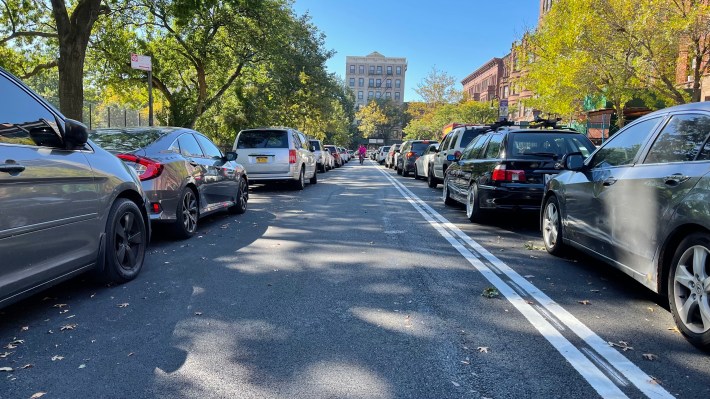
The impact of the NYPD’s neglect of 311 complaints is clear outside Marcus Garvey Park in Harlem.
The city redesigned the streets surrounding the park in 2013 to calm traffic and add pedestrian space. But within a few years, Seth Cunningham, who lives nearby, started seeing cars parked in the new pedestrian zones — first city vehicles, then others with assorted parking placards on their dashboards.
Cunningham began filing 311 complaints about the issue, but the local precinct would close them out, almost always without ticketing the drivers or forcing them to move.
So Cunningham stopped filing the complaints, and drivers still park there, now even private cars with no placards — official or otherwise.
“It’s just very depressing to see how dysfunctional everything is,” he said. “How it seems like so many of the actors whose job it is to clearly do certain things, they clearly have no interest in doing them.”
For other New Yorkers, the effect of years of ignored 311 reports goes beyond disillusionment.
"One day when I’m inevitably killed by a car on Fifth Avenue, my husband can use my 311 complaints to prove Fifth Avenue was dangerous,” said Sarah Moffitt of Brooklyn.
“At least somewhere there’s a record of a problem," she said, "even if no one did anything about it.”
About the data
Streetsblog’s findings are based on an analysis of city data on more than 26 million 311 service requests submitted between Jan. 1, 2010, and Sept. 27, 2021. According to the city, the data does “not present a full picture of 311 calls or service requests, in part because of operational and system complexities associated with remote call taking necessitated by the unprecedented volume 311 is handling during the COVID-19 crisis.”
For the precinct-level analysis, Streetsblog merged the 311 data with precinct boundary GIS data. Streetsblog excluded from this analysis a small number of complaints that did not include geographic coordinates.
Streetsblog defined “driver misconduct” as the following 311 service request categories: blocked bike lane, blocked crosswalk, blocked hydrant, blocked sidewalk, chronic speeding, chronic stoplight violation, commercial overnight parking, detached trailer, double parked blocking traffic, double parked blocking vehicle, drag racing, overnight commercial storage, parking permit improper use, posted parking sign violation, truck route violation, unauthorized bus layover, abandoned vehicle with license plate. All of these calls are automatically routed by 311 to the NYPD.
